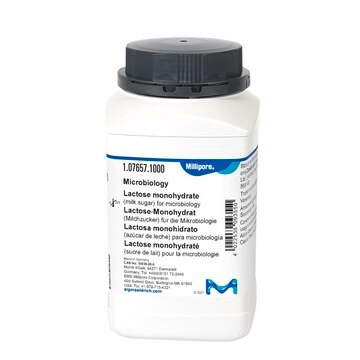8.20261
8-Hydroxyquinoline
for synthesis
Synonym(s):
8-Hydroxyquinoline, Oxine, 8-Quinolinol
About This Item
Recommended Products
Quality Level
Assay
≥99.0% (GC)
form
solid
potency
1200 mg/kg LD50, oral (Rat)
reaction suitability
reaction type: Addition Reactions
bp
267 °C/1013 hPa
mp
72.5-74.0 °C
solubility
555 mg/L
density
1.034 g/cm3 at 20 °C
application(s)
peptide synthesis
storage temp.
2-30°C
SMILES string
n1c2c(ccc1)cccc2O
InChI
1S/C9H7NO/c11-8-5-1-3-7-4-2-6-10-9(7)8/h1-6,11H
InChI key
MCJGNVYPOGVAJF-UHFFFAOYSA-N
Application
<li><strong>8-Hydroxyquinoline in luminescent cocrystals for analytical detection:</strong> 8-Hydroxyquinoline is used as an electron donor during the development of luminescent organic cocrystal for the detection of 2,4-dinitroaniline, demonstrating its utility in analytical chemistry applications (Liu et al., 2024).</li>
<li><strong>Extraction and determination of pesticides using 8-Hydroxyquinoline functionalized nanocomposites:</strong> Poly(8-hydroxyquinoline) were utilized for the extraction and determination of organophosphorus pesticides in various environmental samples, showcasing its application in environmental monitoring (Shahsavani and Fakhari, 2024).</li>
<li><strong>8-Hydroxyquinoline in medical imaging and therapy:</strong> 8-Hydroxyquinoline is used as a Schiff base derivative and an auxiliary ligand in the synthesis of the dinuclear lanthanide complex [Ho2(L)2(acac)2(CH3OH)2] (Cong et al., 2024).</li>
</ul>
Analysis Note
Melting range (lower value): ≥ 71 °C
Melting range (upper value): ≤ 74 °C
Identity (IR): passes test
Signal Word
Danger
Hazard Statements
Precautionary Statements
Hazard Classifications
Acute Tox. 3 Oral - Aquatic Acute 1 - Aquatic Chronic 1 - Eye Dam. 1 - Repr. 1B - Skin Sens. 1
Storage Class Code
6.1C - Combustible, acute toxic Cat.3 / toxic compounds or compounds which causing chronic effects
WGK
WGK 3
Flash Point(F)
Not applicable
Flash Point(C)
Not applicable
Certificates of Analysis (COA)
Search for Certificates of Analysis (COA) by entering the products Lot/Batch Number. Lot and Batch Numbers can be found on a product’s label following the words ‘Lot’ or ‘Batch’.
Already Own This Product?
Find documentation for the products that you have recently purchased in the Document Library.
Our team of scientists has experience in all areas of research including Life Science, Material Science, Chemical Synthesis, Chromatography, Analytical and many others.
Contact Technical Service











